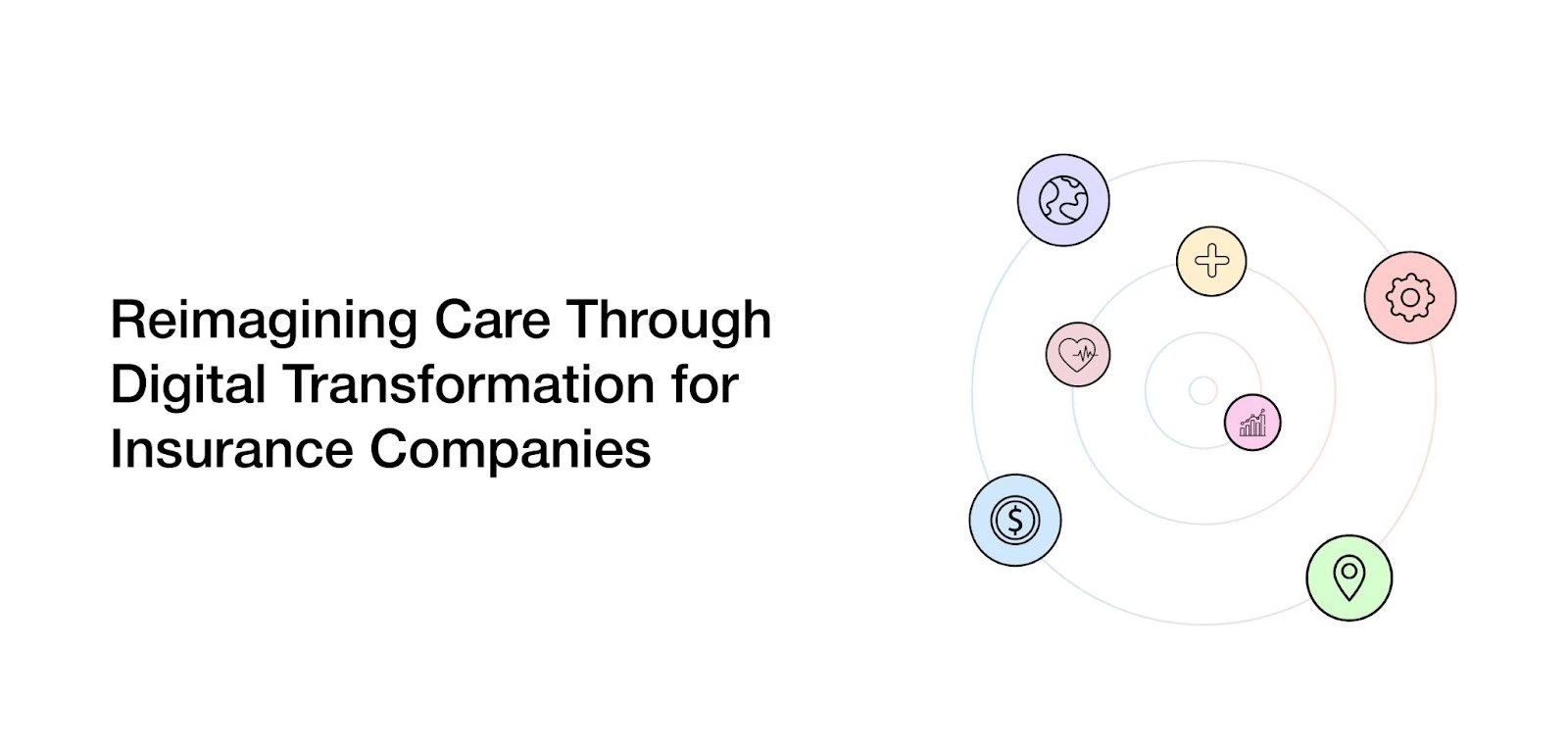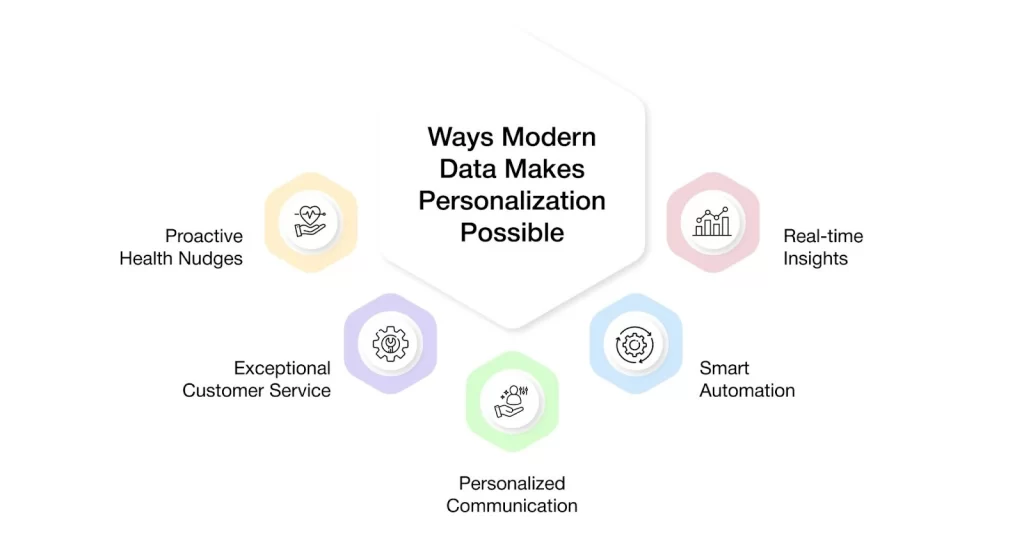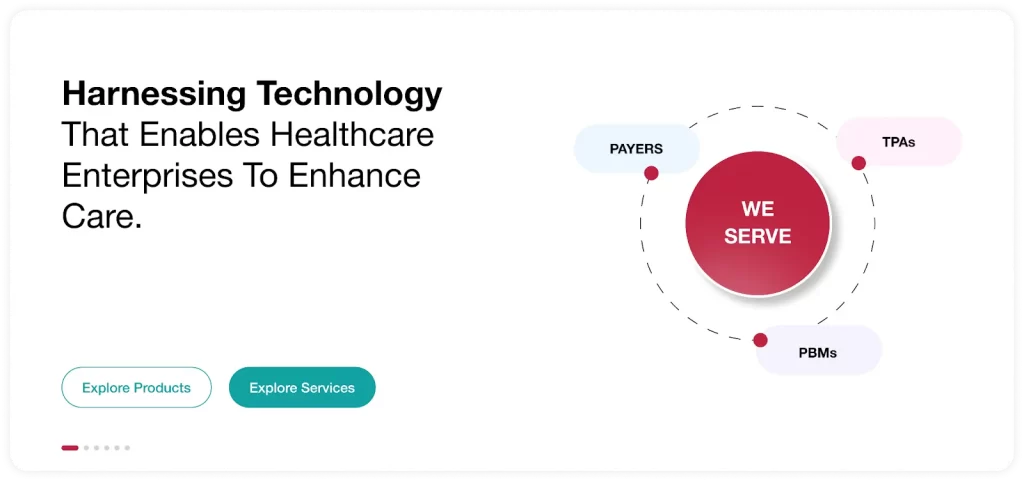
In today’s rapidly evolving digital landscape, healthcare insurers are under growing pressure to deliver personalized, customer-focused experiences. Yet, fragmented data silos and legacy technology create significant barriers, preventing them from meeting these evolving expectations effectively.
To remain competitive, insurers must modernize their technology by upgrading legacy systems, enhancing data integration, and leveraging advanced analytics. These improvements enable smoother operations and empower insurers to offer services tailored to consumers’ unique needs, resulting in higher satisfaction and long-term loyalty.
In this blog, we’ll explore the critical role data modernization plays in enabling hyper-personalized customer experiences. We’ll examine the benefits and the challenges insurers face during data modernization, and how these efforts help create customer experiences that truly feel personalized.
What Does It Mean To Modernize Healthcare Insurance Data?
Data modernization serves as the essential foundation for creating a more agile and customer-focused healthcare insurance provider. For healthcare insurers, this process typically involves the following key elements:
Upgrading Legacy Systems
Many insurers still operate within outdated legacy environments that are ill-equipped to support modern digital demands. Modernizing these systems enables insurers to adopt new technologies, improve data management, and deliver more responsive, personalized products, ultimately enhancing both business performance and customer experience.
Enhancing Data Integration And Interoperability
A key component of data modernization is breaking down silos and enabling seamless communication across disparate systems. By integrating data from sources like EHRs, claims systems, health contracts, and member profiles, insurers gain a unified view of each customer. This holistic perspective empowers faster, data-driven decision-making in the
The insurance sector supports more personalized and effective service delivery.
Strengthening Data Security And Compliance
As the volume of digital health data grows, maintaining robust security and regulatory compliance is more critical than ever. Modernized systems help insurers safeguard sensitive customer information while supporting advanced risk analytics and ensuring adherence to standards like HIPAA and GDPR. This not only minimizes risk but also builds greater trust with members and stakeholders, a cornerstone of data compliance and risk analytics for insurance firms.
How Modern Data Infrastructure Powers Hyper-Personalized Customer Experiences?

Hyper-personalization is about delivering highly tailored experiences that meet the unique needs of each customer. For healthcare insurers, this translates to offering the right products, pricing, and services, driven by real-time data and predictive analytics.
A modern data infrastructure makes this possible by enabling insurers to gather, integrate, and analyze data from multiple touchpoints. With a unified view of customer data, insurers can make faster, smarter decisions and deliver truly personalized experiences across the entire digital customer journey.
Following are the various ways data modernization drives hyper-personalized customer experiences:
1. Real-Time Data Insights: Modern data systems empower insurers to capture and analyze data in real time. This allows them to personalize offers, adjust coverage, and dynamically price plans based on each customer’s evolving needs and behaviors, improving relevance, satisfaction, and retention.
2. AI-Enabled Automation: Modern data infrastructure supports the deployment of AI and machine learning applications in insurance analytics that can automate key aspects of the healthcare insurance process. AI-driven platforms analyze customer behavior, preferences, and risk profiles to deliver hyper-personalized experiences such as recommending suitable plan options, customizing coverage, or triggering real-time updates based on life events or risk changes.
Automation in insurance not only improves operational efficiency but also ensures timely, relevant, and proactive engagement with customers.
3. Tailored Communication: Modern data infrastructure enables insurers to deliver context-aware, personalized communication across channels. Platforms like VIZCare AI empower both chatbots and live agents to engage with customers in a way that feels relevant, timely, and meaningful. By leveraging real-time data and customer history, insurers can ensure that every interaction whether digital or human, reflects a clear understanding of individual needs, ultimately enhancing trust and satisfaction, a key feature of the customer engagement platforms.
4. Exceptional Customer Service: Modern data infrastructure allows insurers to provide smarter, more responsive customer service by equipping support teams with a 360-degree view of each customer. With integrated data from claims, interactions, preferences, and health records, service agents and AI-powered assistants can resolve issues faster, offer personalized guidance, and proactively address concerns leading to higher customer satisfaction and loyalty.
5. Proactive Wellness & Preventive Care Recommendations: Leveraging predictive analytics and real-time health data, modern data systems enable insurers to offer tailored wellness programs and preventive care suggestions. From fitness goals to chronic disease management, customers receive personalized insights and nudges that align with their health status and lifestyle, making this one of the key examples of insurance data analytics. This not only improves individual health outcomes but also fosters deeper engagement and long-term trust.
What Are the Biggest Challenges Faced While Modernizing Healthcare Insurance Data Systems?
Despite its advantages, data modernization presents healthcare insurers with several key challenges. These include:
Legacy System Integration
Healthcare insurance enterprises often struggle to integrate outdated legacy systems characterized by siloed architectures and limited modularity with modern technologies. These legacy platforms lack the flexibility required to support digital transformation initiatives and the adoption of advanced business intelligence tools, thereby slowing down the overall modernization process.
Data Security And Privacy
Managing sensitive customer data introduces critical challenges around security and privacy. Modern systems implemented by insurers must strictly comply with regulatory requirements, such as HIPAA and GDPR, to prevent breaches and ensure customers’ data is protected. Maintaining robust security measures is essential to building trust and safeguarding the integrity of customer information throughout the modernization process.
Resistance To Change
Cultural resistance within organizations can significantly hinder the smooth adoption of new technologies. Teams may be reluctant to move away from familiar legacy systems, while leadership faces the challenge of effectively communicating the benefits and necessity of modernization. Overcoming this resistance is crucial to ensuring successful implementation and maximizing the value of digital transformation efforts.
Solutions To Overcome These Challenges
To effectively overcome the implementation challenges of data modernization, healthcare insurers must embrace the following strategic solutions:
Seamless Integration Tools
Modern platforms like VIZCare Connect act as a vital bridge between legacy systems and modern technologies, providing flexible integration capabilities that ensure smooth and efficient transitions without disrupting existing operations.
Built-In Security And Compliance
Modern solutions come equipped with robust, built-in security and compliance capabilities that safeguard sensitive data and ensure adherence to regulatory standards, enabling secure data flow throughout the system.
Effective Change Management
Effective change management strategies are essential for successful adoption. This includes comprehensive employee training, phased rollouts, and strong leadership advocacy to minimize resistance and ensure a smooth transition.
Adaptive Scalability
Modern platforms like VIZCare Connect are designed to scale effortlessly, growing with the organization and adapting seamlessly to evolving needs—ensuring sustained success over time.
Data Modernization Made Easy With VIZCare

Data modernization is about creating seamless data flow across systems to enable smarter, faster decision-making.
To help healthcare enterprises achieve this, AVIZVA offers VIZCare Connect, a healthcare data connectivity platform designed to address their end-to-end data integration & interoperability needs. It is a first-of-its-kind platform that provides full real-time visibility into data movements, dependencies, and bottlenecks empowering informed decision-making and ensuring efficient management across the entire data lifecycle.
True interoperability, enabled by platforms like VIZCare Connect is foundational for delivering hyper-personalized customer experiences. VIZCare Empower, another future-proof offering by AVIZVA, builds on this foundation by connecting data insights across systems to craft personalized, context-rich interactions.
VIZCare Empower is a one-stop AI-enabled healthcare platform for internal teams to manage the complete lifecycle of healthcare business operations. It centralizes all the critical data, tools, and context that the teams need to manage and service every consumer – whether they’re members, providers, brokers, or employers. VIZCare Empower eliminates silos, brings all service teams together in one place to provide personalized, efficient, and proactive assistance with ease.
A modernized data infrastructure also supports the deployment of cutting-edge AI solutions, such as VIZCare AI, built by AVIZVA. It is a healthcare AI platform with ready-to-deploy agents and the freedom to build your own applications. The ready-to-deploy conversational AI applications within VIZCare AI empower all stakeholders in the healthcare ecosystem —including members, providers, employers, brokers, and operations teams —to engage effortlessly and intelligently. Built for healthcare from the ground up, these AI-driven solutions deliver personalized, context-aware interactions that automate workflows, resolve inquiries in real time, and reduce operational load.
Seamlessly integrated across channels, they create a smarter, more connected experience at every touchpoint, enhancing satisfaction, speed, and system-wide productivity.

Conclusion
Modernizing data infrastructure has evolved from a strategic choice to a business imperative for healthcare insurance enterprises. As customer expectations continue to rise, insurers must unlock the full potential of their data. Doing so not only helps them stay competitive but also enables them to lead the way in delivering highly personalized, customer-centric experiences.
By modernizing their technology, integrating data across systems, and leveraging advanced tools like AI and automation, insurers can offer services that align precisely with each customer’s unique needs. This results in improved customer satisfaction, stronger loyalty, and higher retention rates.

FAQs
1. How does data integration improve customer engagement in the insurance industry?
Data integration consolidates customer data from various sources into a single, accessible platform. This allows an insurer to customize services, anticipate customer requirements, and provide timely answers, thereby directly improving engagement and satisfaction.
2. How does AI-powered data analytics contribute to customer satisfaction in insurance?
Using AI-powered data analytics, an insurer can analyze vast amounts of data to foresee customer needs, interact with customers, and optimize its products and services. Therefore, the insurer tends to provide relevant suggestions much faster than previously, which satisfies the customer more.
3. What role do data security and compliance play in data modernization for insurers?
Data security and compliance are integral elements of data modernization that must be met to safeguard sensitive customer data from mishandling and to comply with regulations set by bodies like HIPAA, GDPR, and other relevant regional legislations.
4. How can small insurance providers benefit from data modernization?
Smaller insurers would use a data analytics solution to better study consumer behavior, enable efficient operations, and provide tailored products. Thus, these smaller firms compete with big insurers on the fronts of efficiency, automation, and customer retention.
5. What tools and technologies are essential for effective data modernization in insurance?
Essential tools for data modernization are cloud computing environments, AI-based analytics platforms, machine-learning platforms, and automation tools. This sort of technology allows the insurers to organize their databases, make decisions, and provide hyper-personalized insurance programs at high speed.
